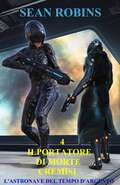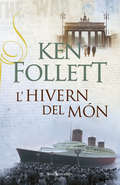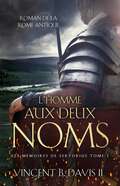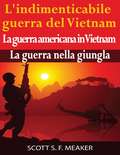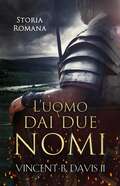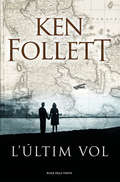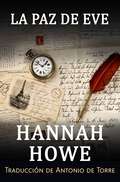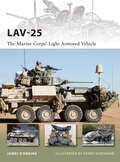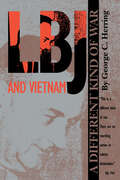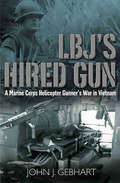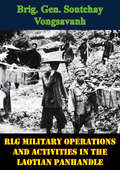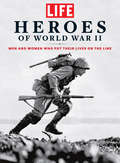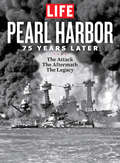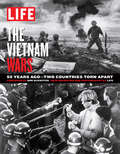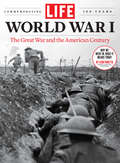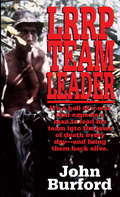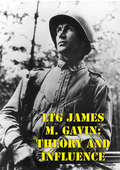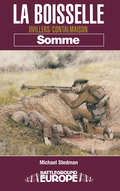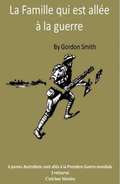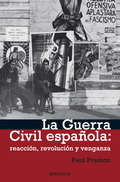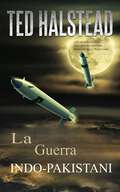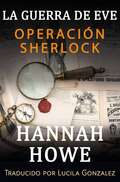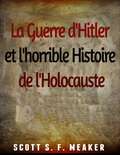- Table View
- List View
L'astronave del tempo d'argento
by Sean RobinsSeguendo l'audace piano di Jim, Kurt e una squadra di Marines viaggiano nel futuro per distruggere Voltex. Tuttavia, così facendo, hanno inavvertitamente avviato una reazione a catena che si è conclusa con lo sterminio di tutta la vita nell'universo. Ora i nostri eroi devono riunirsi ancora una volta per salvare l'universo prima che sia troppo tardi. L'astronave del tempo d'argento, il quarto libro della serie bestseller "il portatore di morte cremisi", ha tutto ciò che rende questi libri così popolari: viaggi nel tempo, epiche battaglie spaziali, colpi di scena imprevedibili e personaggi che saltano fuori dalla pagina. Leggerai l'astronave del tempo d'argento tutto d'un fiato e ne vorrai di più! Leggi l'ultima avventura di Jim!
L'hivern del món (The Century #Volumen 2)
by Ken FollettEls fills de les cinc famílies protagonistes de La caiguda dels gegants forjaran el seu destí en els anys turbulents de la Segona Guerra Mundial, la guerra civil espanyola, el bombardeig de Pearl Harbor i l'era de la bomba atòmica. Segon volum de la trilogia «The Century» L'any 1933, Berlín és un focus d'agitació política i social. Lady Maud, ara esposa de Walter von Ulrich i mare de dos fills, publica articles en una revista setmanal que ridiculitzen el Partit Nazi, mentre que Walter manifesta la seva oposició en el Parlament. Sembla, però, que res no frenarà el poder ascendent del canceller Adolf Hitler. Quan Ethel Williams i el seu fill Lloyd visiten els von Ulrich, seran testimonis de la tirania i la repressió de la nova Alemanya. El domini del Tercer Reich s'estendrà fins a França i més enllà de la frontera russa, mentre que, a Anglaterra, Lloyd Williams, activista polític com la seva mare, lluitarà amb l'exèrcit britànic per intentar frenar l'avenç dels nazis i s'allistarà a les brigades internacionals durant la guerra civil espanyola. Participarà a l'ofensiva de Saragossa i a la batalla de Belchite. A Ty Gwyn, la mansió familiar dels Fitzherbert a Gal·les, s'allotjaran els oficial britànics i el tinent William Lloyd se sentirà atret per la dona del Boy Fitzherbert, la rica hereva nord-americana Daisy Peixkov. «La trilogia "The Century" és la història dels meus avis i dels vostres, dels nostres pares i de les nostres vides. D'alguna manera, és la història de tots nosaltres.»Ken Follett La crítica ha dit...«La saga atrapa i la intensitat dels personatges et submergeix en el relat. Un treball de plena coherència, cohesió i pulcritud.»El Periódico de Catalunya «En melodrama èpic i generacional en el qual es posa de manifest el millor i el pitjor de l'ésser humà.»La Razón
L'homme aux deux noms: Roman de la Rome Antique
by Vincent B. Davis IIPour préserver son village, un homme pacifique doit survivre dans la sanglante ville de Rome. «Les forces narratives de Davis résident dans la description des horribles réalités de la guerre et dans sa manière de donner vie au contexte historique… » -Publishers Weekly Rome, 107 av. Quintus Sertorius vient de perdre son père et risque de perdre son foyer. Lorsque son village rural est dépouillé de son statut politique, il doit quitter sa famille pour assurer leur subsistance et leur protection à l'intérieur du gouvernement sanguinaire de Rome. Alors qu'il passe du statut de paysan à celui de politicien, il se retrouve au cœur d'une guerre politique acharnée... Tandis que Quintus s'efforce d'obtenir l'aide dont son village a désespérément besoin, il se rapproche de Gaius Marius, l'oncle de Jules César lui-même. Mais chaque jour qui passe dans le paysage impitoyable de la Ville éternelle met sa famille et sa propre vie en danger. Dans un impitoyable combat de conscience, Quintus risque de tout perdre: ses proches et sa raison. L'homme aux deux noms est le premier livre de la série de fiction historique Sertorius Scrolls. Si vous aimez les ambitions héroïques, les cadres historiques bien documentés et la corruption romaine, vous aimerez le récit puissant de Vincent B. Davis II. Achetez L'homme aux deux noms pour vous plonger dans le monde ténébreux de Rome dès aujourd'hui !
L'indimenticabile guerra del Vietnam: La guerra americana in Vietnam – La guerra nella giungla
by Scott S. F. Meaker Cinzia PasqualinoIl numero di battaglie per il potere che fanno parte del tessuto del Vietnam è alquanto evidente. Le battaglie erano brevi, intense e combattute nelle giungle e nelle risaie. Gran parte della guerra implicava degli attacchi di guerriglia.
L'uomo dai due nomi
by Vincent B. Davis IIRome, 107 BC. Quintus Sertorius just lost his father and he may lose his home. When his rural village is stripped of its political status, he must leave his family to secure their food and protection from Rome's government. As he transitions from countryman to politician and soldier, he's thrust into the middle of a bitter political war. As Quintus struggles to gain the aid his village so desperately needs, he approaches Gaius Marius, the uncle of Julius Caesar himself. Roma, 107 a.C. Quinto Sertorio ha appena perso suo padre e potrebbe perdere la sua casa. Quando il suo villaggio rurale viene privato del suo status politico, deve lasciare la famiglia per assicurarsi cibo e protezione da parte del governo di Roma. Mentre passa da imprenditore di campagna a politico e soldato, si trova nel bel mezzo di un'aspra guerra politica. Lottando per ottenere l'aiuto di cui il suo villaggio ha disperatamente bisogno, si avvicina a Gaio Mario, lo stesso zio di Giulio Cesare.
L'últim vol
by Ken FollettUn relat de suspens genial, magistral i amb uns personatges carismàtics que reafirmen Ken Follett com a mestre indiscutible del gènere. Al juny del 1941, en plena Segona Guerra Mudial, les tropes del Tercer Reich marxen victorioses per tot Europa i no hi ha ningú capaç d'enfrontar-s'hi. Els avions anglesos que han de bombardejar Alemanya són destruïts per l'enemic que, sense que ningú s'ho expliqui, en coneix a la perfecció les rutes i destinacions. Se sospita que els alemanys disposen d'algun aparell mortífer. L'Hermia Mount, una jove agent de l'MI6, prova de posar-se en contacte amb una organització de la Resistència que opera a la Dinamarca ocupada i amb la qual col·labora el seu company, el pilot Arne Olufsen. Tots els indicis fan pensar que en alguna base alemanya s'amaga un sistema de radar molt més perfeccionat que l'anglès. En Harald, el germà de l'Arne, viatjarà fins a Gran Bretanya en un vell biplà per revelar aquesta informació vital.
LA PAZ DE EVE: Una secuela de La guerra de Eve, las heroínas de la SOE (La guerra de Eve: heroínas de la SOE #13)
by Hannah HoweAmbientada en 1948, La paz de Eve es una novela breve e independiente que evoca el pasado de Eva, sus luchas en el presente y sus esperanzas para el futuro. —Estoy aquí porque Cunningham quiere que encuentre a la Kriminalrätin Gisela Winter. Trabaja para un nuevo departamento, muy confidencial. —¿La quieren para los juicios de crímenes de guerra? —Eso dijo, pero sospecho que sus motivos van más allá. —¿Por qué lo crees? —preguntó Guy. —Cunningham mostró poco interés en Gisela Winter cuando regresamos de Francia; no era una prioridad para él entonces. Creo que algo ha surgido en estos tres años, algo que ha llamado la atención de Cunningham y su nuevo departamento. Tal vez esté relacionado con crímenes de guerra, o quizá con otro aspecto de la vida de Gisela. —¿Por dónde empezarás? —Marsella. —¿Hablarás con Michel y miembros de la Resistencia? —Sí. Guy dudó. Parecía inquieto, confuso. —¿Michel aún quiere que vuelvas con él? —Sí. —¿Y tú cómo te sientes con eso? Observé el muro en la zanja. Solo quedaban los cimientos. Aun así, era notable que esa estructura hubiera sobrevivido dos mil años. Me pregunté si nuestros edificios durarían tanto. —¿Todavía lo amas? —insistió Guy. Lo miré a los ojos. —El hombre al que amo eres tú —afirmé.
LAV-25
by James D'Angina Henry MorsheadThe Light Armored Vehicle -25 (LAV-25) has played a significant role in transforming Marine Corps doctrine since its introduction in the early-1980s. The Marine Corps Light Armored Vehicle program was based on the proven Swiss MOWAG Piranha series of 4x4, 6x6, and 8x8 wheeled vehicles. However, developing organizational units, tactics, and employment of the weapon system within the force structure of the Marine Corps proved to be more of a challenge than fielding the weapon system. This resulted in multiple re-designations for LAV units within the Corps. The LAV first saw combat action in Panama during Operation Just Cause (1989); LAV-25s have fought in every major conflict since - to include the current conflicts during Operation Enduring Freedom, Afghanistan and Operation Iraqi Freedom, Iraq. During Operation Desert Storm the vehicle's record shows mixed results due to a string of friendly fire incidents; however one LAV-25 Commander earned the Navy Cross (one of only two Navy Crosses awarded to Marines during the Gulf War). The success of the LAV program has translated to several operators such as Canada, Australia, and the Saudi Arabian National Guard employing the weapon system for their own forces. This in-depth, highly-illustrated title will shed new light on this popular subject.From the Trade Paperback edition.
LBJ and Vietnam: A Different Kind of War (An Administrative History of the Johnson Presidency)
by George C. HerringDecades later, the Vietnam War remains a divisive memory for American society. Partisans on all sides still debate why the war was fought, how it could have been better fought, and whether it could have been won at all. <P><P> In this major study, a noted expert on the war brings a needed objectivity to these debates by examining dispassionately how and why President Lyndon Johnson and his administration conducted the war as they did. Drawing on a wealth of newly released documents from the LBJ Library, including the Tom Johnson notes from the influential Tuesday Lunch Group, George Herring discusses the concept of limited war and how it affected President Johnson's decision making, Johnson's relations with his military commanders, the administration's pacification program of 1965-1967, the management of public opinion, and the "fighting while negotiating" strategy pursued after the Tet Offensive in 1968.
LBJ and Vietnam: A Different Kind of War (An Administrative History of the Johnson Presidency)
by George C. Herring&“[A] compelling analysis . . . A solid addition to our understanding of the Vietnam War and a president.&” —Publishers Weekly The Vietnam War remains a divisive memory for Americans—partisans on all sides still debate why it was fought, how it could have been better fought, and whether it could have been won at all. In this major study, a noted expert on the war brings a needed objectivity to these debates by examining dispassionately how and why President Lyndon Johnson and his administration conducted the war as they did. Drawing on a wealth of newly released documents from the LBJ Library, including the Tom Johnson notes from the influential Tuesday Lunch Group, George Herring discusses the concept of limited war and how it affected President Johnson&’s decision making, Johnson&’s relations with his military commanders, the administration&’s pacification program of 1965–1967, the management of public opinion, and the &“fighting while negotiating&” strategy pursued after the Tet Offensive in 1968. This in-depth analysis, from a prize-winning historian and National Book Critics Circle Award finalist, exposes numerous flaws in Johnson&’s approach, in a &“concise, well-researched account&” that &“critiques Johnson's management of the Vietnam War in terms of military strategy, diplomacy, and domestic public opinion&” (Library Journal).
LBJ's Hired Gun
by John J. GebhartMany Vietnam memoirs have appeared in recent years, but not a single one has the humor, pathos, poignancy, and often sheer hilarity of John J. Gebhart's riveting LBJ's Hired Gun. As Gebhart tells it, he was a "smart-mouthed college boy" who joined the Marines to see the world and "dust a few black pajamas for Uncle Sam." Two grueling tours of duty later (1965-1967), he returned home as a sergeant after surviving 240 combat missions (12 air medals) and being shot down twice. On his chest was the Navy Commendation Award (with the combat V). LBJ's Hired Gun launches with Gebhart's grim recollection of the intense, old-school brutality that was Marine Corps training on Parris Island before transitioning to his difficult journey for Southeast Asia aboard a troop transport with two thousand other nameless grunts. These hardships offered but a glimpse of the suffering he and his comrades were about to endure. His candid account of life and death in Vietnam is written with a lively, infectious flair. But be forewarned: No attempt has been made to sanitize this memoir with politically correct language. Gebhart tells his story exactly as he and his comrades spoke in the 1960s. The result is a gripping, no-holds-barred memoir of his "misadventures in-country." He spares no detail and no one in his effort to convey exactly what he and his comrades experienced in Vietnam. Here is how the author describes Vietnam: "What was not to like about Vietnam? It was a tropical paradise filled with lush green forests and mountains, endless rice paddies, and beautiful beaches with clear green water. You get all the free ammunition you want, endless cold beer to drink, and boom-boom girls to party with. Who could ask for more? Of course, there were some minor problems like all the VCs and NVAs who wanted to kill us. Everyone counted the days they had left before rotating back to the land of the big PX. I was having such a great vacation I signed up for another 12-month tour. I spent twenty-four action-filled months dusting VCs and NVAs, rescuing reconnaissance teams, flying LZ prep missions, delivering mail to bases where you came in shooting and flew out the same way. Somewhere along the line they decided I should be decorated for killing the enemy." This is not just another book about Vietnam written by an officer. LBJ's Hired Gun is the story of an enlisted man who lived on a dead-end street in West Philadelphia, intent on lifting your spirits and putting a smile on your face as you journey with him across the world and meet the people, explore the places, and relive the events that shaped Marine Corps history in Vietnam from September 1965 to September 1967. There are many outstanding Vietnam memoirs. LBJ's Hired Gun stands heads and shoulders above them all.
LG Military Operations And Activities In The Laotian Panhandle (Indochina Monographs #8)
by Brig. Gen. Soutchay VongsavanhThis monograph forms part of the Indochina Monograph series written by senior military personnel from the former Army of the Republic of Vietnam who served against the northern communist invasion."The Kingdom of Laos, because of geographical location, was destined to play a major role as North Vietnam endeavored to expand her area of influence throughout Indochina. This is especially true of the Laotian Panhandle which borders both South Vietnam and Cambodia. Following the March 1970 coup in Cambodia, the closure of the port of Sihanoukville to the Communists and the increasing effectiveness of navy Market Time barrier operations, southern Laos became even more important to the enemy for the movement of supplies and men to support Communist activities in South Vietnam and Cambodia.This monograph reviews and analyzes Royal Lao Government military operations and activities in the Laotian Panhandle. I have devoted special attention to the significance of the panhandle for enemy military operations in South Vietnam and Cambodia, the initiation of conventional warfare in southern Laos, lessons learned during the employment of regular and irregular forces and developments following the 1973 cease-fire. As author, I am fortunate to be able to draw on my personal experience as Commanding General of Military Region 4 from 1 July 1971 until my exodus 13 June 1975."-Author's Preface.
LIFE Heroes of World War II: Men and Women Who Put Their Lives on the Line
by The Editors of LifeA moneygrubbing Nazi who spent his fortune saving Jews, a Bon Marche perfume seller who became a British spy, a Polish priest who gave his life so that another man could live. These are just a few of the ordinary people who became extraordinary heroes - on and off the battlefields of World War II.
LIFE Pearl Harbor: 75 Years Later: The Attach - The Aftermath - The Legacy
by The Editors of LIFELIFE commemorates the 75th anniversary of the attacks on Pearl Harbor.
LIFE The Vietnam Wars: 50 Years Ago - Two Countries Torn Apart
by The Editors of LifeLIFE Magazine presents a special on the Vietnam Wars.
LIFE World War I: The Great War and the American Century
by The Editors of LifeIn 1914, the assassination of Archduke Franz Ferdinand-who was in line for the throne of the Austro-Hungarian Empire-propelled Europe into a war unlike any the world had ever seen. But it would take yet another remarkable series of events for the United States to decide to enter the fray, a century ago in April of 1917. By the time the armistice arrived the following year, empires had fallen and 15 million combatants lay dead. And for the United States, the consequences of the decision to get involved would reverberate throughout would come to be known as the American Century, and still echo today.Includes:How the actions of teenage Bosnian nationalists set the war in motion-and why European leaders could not (or would not) stop itThe birth of modern warfare and the brutal results that came with poison gas, airplanes and tanksAmerican leaders facing a future in which isolation is no longer an optionHow the underprepared U.S. military helped put an end to years of war-and emerged one of the world's great fighting forcesPlus: the Versailles Treaty and the League of Nations and how they failed to avert an even more cataclysmic war two decades later
LRRP Team Leader: A Memoir of Vietnam
by John BurfordVietnam, 1968. All of Sergeant John Burford's missions with F Company, 58th Infantry were deep in hostile territory. As leader of a six-man LRRP team, he found the enemy, staged ambushes, called in precision strikes, and rescued downed pilots. The lives of the entire team depended on his leadership and their combined skill and guts. A single mistake--a moment of panic--could mean death for everyone.From the Paperback edition.
LTG James M. Gavin: Theory And Influence
by Major Edward P. GavinThis monograph approached Lieutenant General James M. Gavin as a military theorist and explored his influence as the Army transitioned from World War II to the Cold War. Gavin's theory of future warfare required an army with capability in atomic and non-atomic warfare and he recognized the need for readiness for both limited peripheral wars and general war. His theory shaped his vision of the functions, organizations, and technology required to succeed in future conflicts. Gavin organized much of his writing around the concepts of mobility, firepower, and control that he felt were critical for future warfare. His influence shaped development of tactical nuclear weapons, missiles, air mobility, and organizational transformation following World War II and into the Cold War.Gavin's theory of future warfare, his understanding of the Soviet threat, and his concepts of firepower, mobility, and control informed his model of how the Army should organize for future warfare. He envisioned flexible division organizations, capable of fighting dispersed over significant depth, enabled by superior air and ground mobility to deliver firepower adequate prevail on future battlefields...The organization that epitomized Gavin's concepts was the air mobile division that developed from his sky cavalry concept. Gavin's advocacy for the air mobility concept and his specific actions to advance personnel and positions to build and refine sky cavalry and air mobility capabilities were key factors in the eventual development and acceptance of the airmobile division. While airmobile divisions and sky cavalry would likely have emerged without Gavin, his influence clearly advanced the ideas and shaped the form of the organizations.
La Armada desconocida de Jorge Juan (Historia Incógnita)
by Víctor San JuanDon Jorge Juan y Santacilia: Marino, ingeniero, explorador, científico, literato. Genio de la construcción naval. Descubra la gran aventura del diseño y construcción de estos avanzados navíos a vela y su participación en los episodios clave de la historia española de los Siglos XVIII y XIX. Una generación de buques injustamente olvidada que marcaron toda una época.Conozca la obra del ilustrado, científico, capitán de navío Jorge Juan, a través de su legado, medio centenar de navíos construidos entre 1751 y 1769, algunos de los cuales, como el Santísima Trinidad, Septentrión, Guerrero, Vencedor, Glorioso, Velasco, Princesa o Santiago de España, marcaron toda una época. Esta es su historia y, a través de ellos, del genio que los construyó. Estamos acostumbrados a considerar la figura del matemático, marino e ilustrado español Jorge Juan bajo el prisma histórico de su obra científica, sus aventuras en Iberoamérica, Inglaterra y Marruecos o su valor como representante de la ilustración española; pero nunca se ha hecho un inventario de la que fue su gran obra, los navíos que se construyeron bajo su dirección.
La Boiseslle: Ovillers/Contalmaison Somme (Battleground Europe)
by Michael StedmanThis addition to the growing series of battlefield guides has been written by Michael Stedman, author of Thiepval. Drawing upon the wealth of material available in both national and local archives, documentary evidence, personal reminiscence and British and German unit histories, La Boiselle will add enormously to the experience of any visitor to this extraordinary location on the Somme battlefield.This distinctive volume has ample detail to satisfy the discerning expert whilst retaining the accessible style which will ensure that anyone new to these magnificently informative places will feel at home with the text. Apart from the historical detail, La Boiselle is illuminated by a distinctive and detailed array of maps and aerial photographs which will guide the reader both at home and in the field. To support the maps a sequence of contemporary and comparison present-day photographs will enable students to plan and execute a series of enjoyable, informative and evocative tours through the locality. These walks will guide people to little-known sections of still existent front-line and assembly trenches, dug-outs, gun-pits and observation posts, past the memorials and cemeteries, with an eye for detail as well as to the human and personal experience of the conflict. If you are researching the story of a family member who served or is commemorated here, if you wish to deePen & illuminate a visit to a new Western Front location, if you are a student of the battlefield and the military tactics employed here, La Boiselle will add enormously to your knowledge and understanding of this powerful place. In an unsentimental manner, La Boiselle can transport you back across eight decades to understand something of the experience of the Tommies and their German counterparts who fought and died here during the Great War.
La Famille qui est allée à la guerre
by Gordon Smith Bibi Sahida DilmamodeThis book is on the life of a family during the First World War. The Family that went to War” is set back in the early 1900’s during wartime. The story follows six Australian family members as they each choose to go and fight for varying personal reasons. The book recounts their highs, lows, struggles as well as triumphs. It is both inspiring and heartbreaking about what these people were leaving behind (including families and children) and what hardships they faced on their journeys. The story covers their journeys through the war in Europe and explores some of their complex characteristics and the summary of the lives of the three who returned. It also highlights the anguish of the mother whose son was lost on the battlefields of Fromelles and whose body still as not been identified one hundred years later’ Six family members went to war. Only three returned!
La Guerra Civil Española: reacción, revolución y venganza
by Paul PrestonEdición corregida y ampliada con un capítulo inédito sobre la represión durante la guerra. En el septuagésimo aniversario del estallido del trágico conflicto español, Paul Preston, hispanista de prestigio internacional, actualizó y amplió su estudio de la Guerra Civil teniendo en cuenta tanto las últimas investigaciones y polémicas historiográficas como abundante material inédito, ofreciendo su versión definitiva de La guerra civil española. Imprescindible para conocer la violenta realidad que asoló España, este libro contribuye a conservar un relato común de aquella tragedia colectiva, algo esencial para el ejercicio cotidiano de la democracia. Reseña:«La mirada lúcida y certera de un maestro de historiadores sobre la mayor tragedia española del siglo XX.»Enrique Moradiellos
La Guerra Indo-Pakistani: Los Agentes Rusos: Libro 7 (Los Agentes Rusos #7)
by Ted HalsteadDescripción del libro: Rusia se ha enterado de que el robo de dos misiles nucleares tácticos paquistaníes se utilizará para provocar una guerra nuclear entre India y Pakistán. Eso es un problema. Porque la invasión rusa de Ucrania la ha dejado con sólo dos amigos entre los países líderes del mundo. China e India. Y Rusia ha hecho promesas secretas de respaldar a ambos en una guerra nuclear. ¿Podrán los agentes rusos, ayudados por una de las pocas mujeres agentes de la India, impedir una guerra nuclear en el subcontinente? ¿O el conflicto crecerá hasta incluir a Rusia y China, y finalmente comenzará la Tercera Guerra Mundial? “Nunca me pierdo uno de los libros de Ted. Historias muy divertidas. Esta es simplemente una serie de primera clase, excelente escritura. Muy recomendable."
La Guerra de Eve: Operación Sherlock (La Guerra de Eve, Heroínas de la DOE #5)
by Hannah HoweQuinto libro en la serie La Guerra de Eve Heroínas de la DOE La serie está estructurada en doce libros, cada uno de aproximadamente 20,000 palabras, con un intervalo aproximado de dos meses. En el dorso de cada libro, encontrará biografías cortas de los héroes y heroínas reales de la DOE, las personas en las que se basan Eve Beringar, Guy Samson y Mimi Duchamp. Ha sido un honor leer sobre estas personas increíblemente valientes y de principios. Espero que disfrutes sus historias y las hazañas de mis personajes en La Guerra de Eve.
La Guerre d'Hitler et l'horrible Histoire de l'Holocauste
by Hanène Baatout Scott S. F. MeakerNote : La guerre d'Hitler et l'horrible Histoire de l'Holocauste est un résumé. Attention: Contient un contenu très violent. Ce livre est recommandé pour l'âge 18+ L'Holocauste reste comme une référence à la destruction d'environ six millions de Juifs. La collection des undesirables a commencé en 1933 avec la construction du premier camp de concentration. Comme la puissance de Hitler s'est renforcée, il a fait en sorte que d'autres types de gens soient considérés comme inutiles et gênants. Dès qu'Hitler est arrivé au pouvoir, la destruction lente des juifs a été mis en place. En 1942, environ un million de Juifs avaient déjà été tués. L'exécution était l'une des causes de la mort. Deux millions et demi ont été gazés et un demi-million sont morts de faim. L'épidémie de typhus a fait beaucoup d'autres victimes. Après la victoire des Alliés, l'Allemagne a été dans le chaos. Ce livre est un effort qui permet d'observer le type de situation qui permettrait à un pays civilisé de laisser l'Holocauste avoir lieu.
